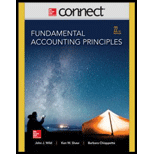
Concept explainers
Introduction:
Closing Entries are used to close out temporary accounts such as Income/Expense/Withdrawals and Income Summary Account at the end of each accounting cycle for preparation of year-end financial statements.
the steps in recording closing entries
Answer to Problem 1DQ
Solution:
There are 4 steps to record closing entries.
1. Close Credit balances from all Revenue accounts to Income Summary
2. Close Debit balances from all Expense accounts to Income Summary
3. Close Income Summary (Net income/Loss) to Capital Account
4. Close Withdrawals account to Capital Account.
Explanation of Solution
Purpose of closing out process is to extend balances of each Income /Expense/Withdrawal/Income summary account to the Capital account so that it enables to identify the net change in Equity for the given accounting period as well as it enables to start next accounting year temporary accounts with a balance of zero.
Closing
1) Close Credit balances from all Revenue accounts to Income Summary by Debiting Revenue Account and Crediting Income Summary Account.
| Dr | Cr | |
| Revenue Account | $X | |
| Income Summary Account | $X |
2) Close Debit balances from all Expense accounts to Income Summary by Crediting Expense Account and Debiting Income Summary Account.
| Dr | Cr | |
| Income Summary Account | $X | |
| Expense Account | $X |
3) Close Income Summary (Net income/Loss) to Capital Account
Net Gain – After closing out all Expenses and Income accounts if Income Summary Account results with a Credit Balance it is a Net gain, which means Income summary account contains more revenues than expenses. It will be closed out by debiting the income summary account and crediting Income summary account as follows.
| Dr | Cr | |
| Income Summary Account | $X | |
| Capital Account | $X |
Net Loss – After closing out all Expenses and Income accounts if Income summary account results with a Debit Balance it is a Net Loss, which means Income summary account contains more expenses than Revenues. It will be closed out by Crediting the Income summary account and Debiting Capital Account
| Dr | Cr | |
| Capital Account | $X | |
| Income Summary Account | $X |
4) Close Withdrawals account to Capital Account by Debiting Capital account and Crediting Withdrawals Account.
| Dr | Cr | |
| Capital Account | $X | |
| Withdrawals Account | $X |
As mentioned above closing out journal entries are recorded to clear out each temporary account at the end of each accounting year end.
Want to see more full solutions like this?
Chapter 4 Solutions
FUND.ACCT.PRIN -ONLINE ONLY >I<
- The following transactions involving intangible assets of Oriole Corporation occurred on or near December 31, 2025. 1.) Oriole paid Grand Company $520,000 for the exclusive right to market a particular product, using the Grand name and logo in promotional material. The franchise runs for as long as Oriole is in business. 2.) Oriole spent $654,000 developing a new manufacturing process. It has applied for a patent, and it believes that its application will be successful. 3.) In January 2026, Oriole's application for a patent (#2 above) was granted. Legal and registration costs incurred were $247,800. The patent runs for 20 years. The manufacturing process will be useful to Oriole for 10 years. 4.) Oriole incurred $168,000 in successfully defending one of its patents in an infringement suit. The patent expires during December 2029. 5.) Oriole incurred $446,400 in an unsuccessful patent defense. As a result of the adverse verdict, the patent, with a remaining unamortized cost of…arrow_forwardReffering to fair value of an asset, division, or organization, What exactly is fair value and how is it assessed?arrow_forwardThe following transactions involving intangible assets of Oriole Corporation occurred on or near December 31, 2025. 1.) Oriole paid Grand Company $520,000 for the exclusive right to market a particular product, using the Grand name and logo in promotional material. The franchise runs for as long as Oriole is in business. 2.) Oriole spent $654,000 developing a new manufacturing process. It has applied for a patent, and it believes that its application will be successful. 3.) In January 2026, Oriole's application for a patent (#2 above) was granted. Legal and registration costs incurred were $247,800. The patent runs for 20 years. The manufacturing process will be useful to Oriole for 10 years. 4.) Oriole incurred $168,000 in successfully defending one of its patents in an infringement suit. The patent expires during December 2029. Oriole incurred 5.) $446,400 in an unsuccessful patent defense. As a result of the adverse verdict, the patent, with a remaining unamortized cost of…arrow_forward
- Please provide the correct answer to this general accounting problem using valid calculations.arrow_forwardCan you explain the correct methodology to solve this general accounting problem?arrow_forwardCan you solve this general accounting question with the appropriate accounting analysis techniques?arrow_forward

 AccountingAccountingISBN:9781337272094Author:WARREN, Carl S., Reeve, James M., Duchac, Jonathan E.Publisher:Cengage Learning,
AccountingAccountingISBN:9781337272094Author:WARREN, Carl S., Reeve, James M., Duchac, Jonathan E.Publisher:Cengage Learning, Accounting Information SystemsAccountingISBN:9781337619202Author:Hall, James A.Publisher:Cengage Learning,
Accounting Information SystemsAccountingISBN:9781337619202Author:Hall, James A.Publisher:Cengage Learning, Horngren's Cost Accounting: A Managerial Emphasis...AccountingISBN:9780134475585Author:Srikant M. Datar, Madhav V. RajanPublisher:PEARSON
Horngren's Cost Accounting: A Managerial Emphasis...AccountingISBN:9780134475585Author:Srikant M. Datar, Madhav V. RajanPublisher:PEARSON Intermediate AccountingAccountingISBN:9781259722660Author:J. David Spiceland, Mark W. Nelson, Wayne M ThomasPublisher:McGraw-Hill Education
Intermediate AccountingAccountingISBN:9781259722660Author:J. David Spiceland, Mark W. Nelson, Wayne M ThomasPublisher:McGraw-Hill Education Financial and Managerial AccountingAccountingISBN:9781259726705Author:John J Wild, Ken W. Shaw, Barbara Chiappetta Fundamental Accounting PrinciplesPublisher:McGraw-Hill Education
Financial and Managerial AccountingAccountingISBN:9781259726705Author:John J Wild, Ken W. Shaw, Barbara Chiappetta Fundamental Accounting PrinciplesPublisher:McGraw-Hill Education





